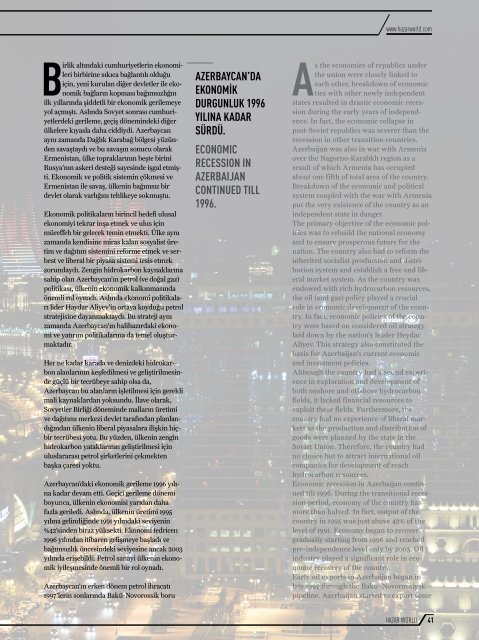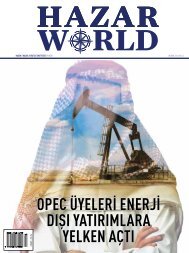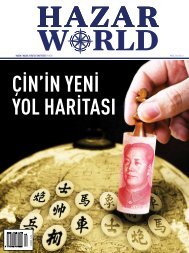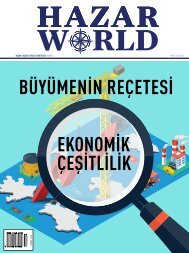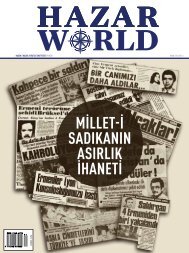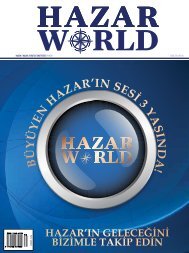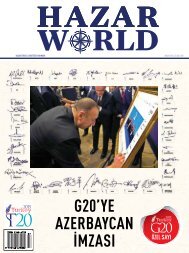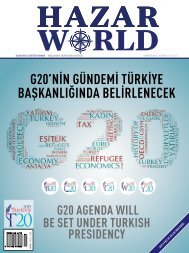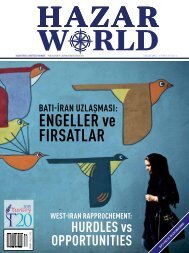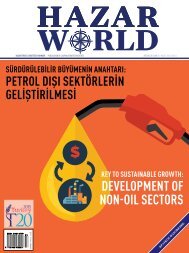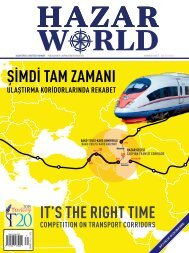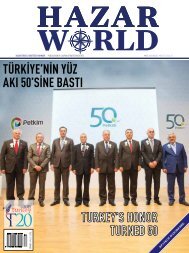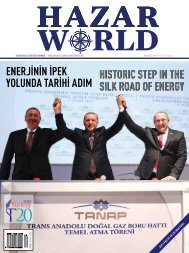Hazar World - Sayı: 24 - Kasım 2014
You also want an ePaper? Increase the reach of your titles
YUMPU automatically turns print PDFs into web optimized ePapers that Google loves.
www.hazarworld.com<br />
Birlik altındaki cumhuriyetlerin ekonomileri<br />
birbirine sıkıca bağlantılı olduğu<br />
için, yeni kurulan diğer devletler ile ekonomik<br />
bağların kopması bağımsızlığın<br />
ilk yıllarında şiddetli bir ekonomik gerilemeye<br />
yol açmıştı. Aslında Sovyet sonrası cumhuriyetlerdeki<br />
gerileme, geçiş dönemindeki diğer<br />
ülkelere kıyasla daha ciddiydi. Azerbaycan<br />
aynı zamanda Dağlık Karabağ bölgesi yüzünden<br />
savaştaydı ve bu savaşın sonucu olarak<br />
Ermenistan, ülke topraklarının beşte birini<br />
Rusya’nın askeri desteği sayesinde işgal etmişti.<br />
Ekonomik ve politik sistemin çökmesi ve<br />
Ermenistan ile savaş, ülkenin bağımsız bir<br />
devlet olarak varlığını tehlikeye sokmuştu.<br />
Ekonomik politikaların birincil hedefi ulusal<br />
ekonomiyi tekrar inşa etmek ve ulus için<br />
müreffeh bir gelecek temin etmekti. Ülke aynı<br />
zamanda kendisine miras kalan sosyalist üretim<br />
ve dağıtım sistemini reforme etmek ve serbest<br />
ve liberal bir piyasa sistemi tesis etmek<br />
zorundaydı. Zengin hidrokarbon kaynaklarına<br />
sahip olan Azerbaycan’ın petrol (ve doğal gaz)<br />
politikası, ülkenin ekonomik kalkınmasında<br />
önemli rol oynadı. Aslında ekonomi politikaları<br />
lider Haydar Aliyev’in ortaya koyduğu petrol<br />
stratejisine dayanmaktaydı. Bu strateji aynı<br />
zamanda Azerbaycan’ın halihazırdaki ekonomi<br />
ve yatırım politikalarına da temel oluşturmaktadır.<br />
Her ne kadar karada ve denizdeki hidrokarbon<br />
alanlarının keşfedilmesi ve geliştirilmesinde<br />
güçlü bir tecrübeye sahip olsa da,<br />
Azerbaycan bu alanların işletilmesi için gerekli<br />
mali kaynaklardan yoksundu. İlave olarak,<br />
Sovyetler Birliği döneminde malların üretimi<br />
ve dağıtımı merkezi devlet tarafından planlandığından<br />
ülkenin liberal piyasalara ilişkin hiçbir<br />
tecrübesi yotu. Bu yüzden, ülkenin zengin<br />
hidrokarbon yataklarının geliştirilmesi için<br />
uluslararası petrol şirketlerini çekmekten<br />
başka çaresi yoktu.<br />
Azerbaycan’daki ekonomik gerileme 1996 yılına<br />
kadar devam etti. Geçici gerileme dönemi<br />
boyunca, ülkenin ekonomisi yarıdan daha<br />
fazla geriledi. Aslında, ülkenin üretimi 1995<br />
yılına gelindiğinde 1991 yılındaki seviyenin<br />
%42’sinden biraz yüksekti. Ekonomi tedricen<br />
1996 yılından itibaren gelişmeye başladı ve<br />
bağımsızlık öncesindeki seviyesine ancak 2003<br />
yılında erişebildi. Petrol sanayi ülkenin ekonomik<br />
iyileşmesinde önemli bir rol oynadı.<br />
Azerbaycan’ın erken dönem petrol ihracatı<br />
1997’lerin sonlarında Bakü-Novorossik boru<br />
AZERBAYCAN’DA<br />
EKONOMİK<br />
DURGUNLUK 1996<br />
YILINA KADAR<br />
SÜRDÜ.<br />
ECONOMIC<br />
RECESSION IN<br />
AZERBAIJAN<br />
CONTINUED TILL<br />
1996.<br />
As the economies of republics under<br />
the union were closely linked to<br />
each other, breakdown of economic<br />
ties with other newly independent<br />
states resulted in drastic economic recession<br />
during the early years of independence.<br />
In fact, the economic collapse in<br />
post-Soviet republics was severer than the<br />
recession in other transition countries.<br />
Azerbaijan was also in war with Armenia<br />
over the Nagorno-Karabkh region as a<br />
result of which Armenia has occupied<br />
about one fifth of total area of the country.<br />
Breakdown of the economic and political<br />
system coupled with the war with Armenia<br />
put the very existence of the country as an<br />
independent state in danger.<br />
The primary objective of the economic policies<br />
was to rebuild the national economy<br />
and to ensure prosperous future for the<br />
nation. The country also had to reform the<br />
inherited socialist production and distribution<br />
system and establish a free and liberal<br />
market system. As the country was<br />
endowed with rich hydrocarbon resources,<br />
the oil (and gas) policy played a crucial<br />
role in economic development of the country.<br />
In fact, economic policies of the country<br />
were based on considered oil strategy<br />
laid down by the nation’s leader Heydar<br />
Aliyev. This strategy also constituted the<br />
basis for Azerbaijan’s current economic<br />
and investment policies.<br />
Although the country had a sound experience<br />
in exploration and development of<br />
both onshore and offshore hydrocarbon<br />
fields, it lacked financial resources to<br />
exploit these fields. Furthermore, the<br />
country had no experience of liberal markets<br />
as the production and distribution of<br />
goods were planned by the state in the<br />
Soviet Union. Therefore, the country had<br />
no choice but to attract international oil<br />
companies for development of reach<br />
hydrocarbon resources.<br />
Economic recession in Azerbaijan continued<br />
till 1996. During the transitional recession<br />
period, economy of the country has<br />
more than halved. In fact, output of the<br />
country in 1995 was just above 42% of the<br />
level of 1991. Economy began to recover<br />
gradually starting from 1996 and reached<br />
pre-independence level only by 2003. Oil<br />
industry played a significant role in economic<br />
recovery of the country.<br />
Early oil exports in Azerbaijan began in<br />
late 1997 through the Baku–Novorossiysk<br />
pipeline. Azerbaijan started to export some<br />
HAZAR WORLD<br />
41


